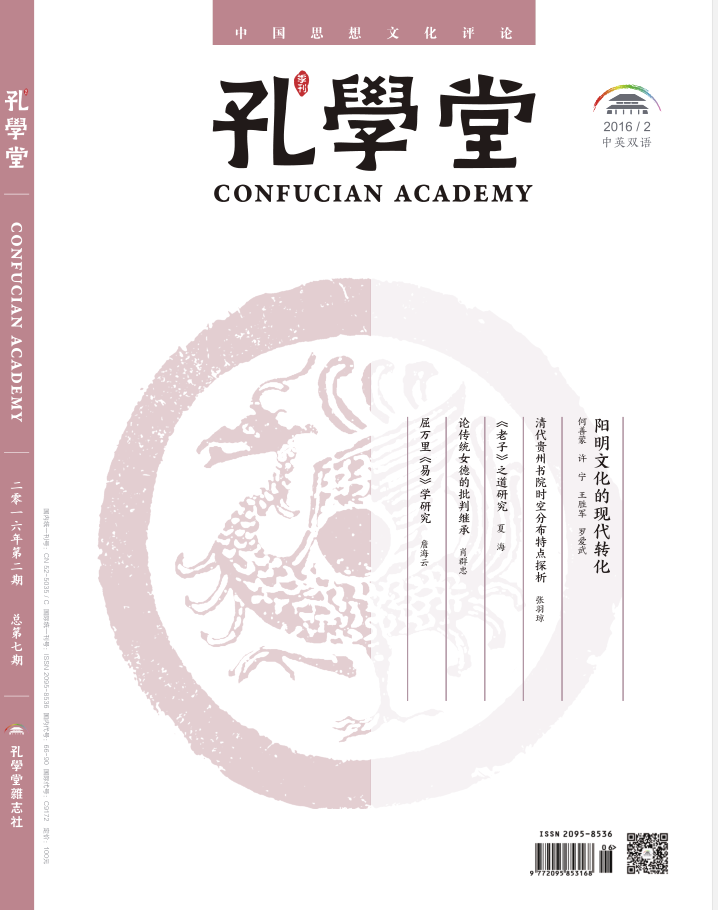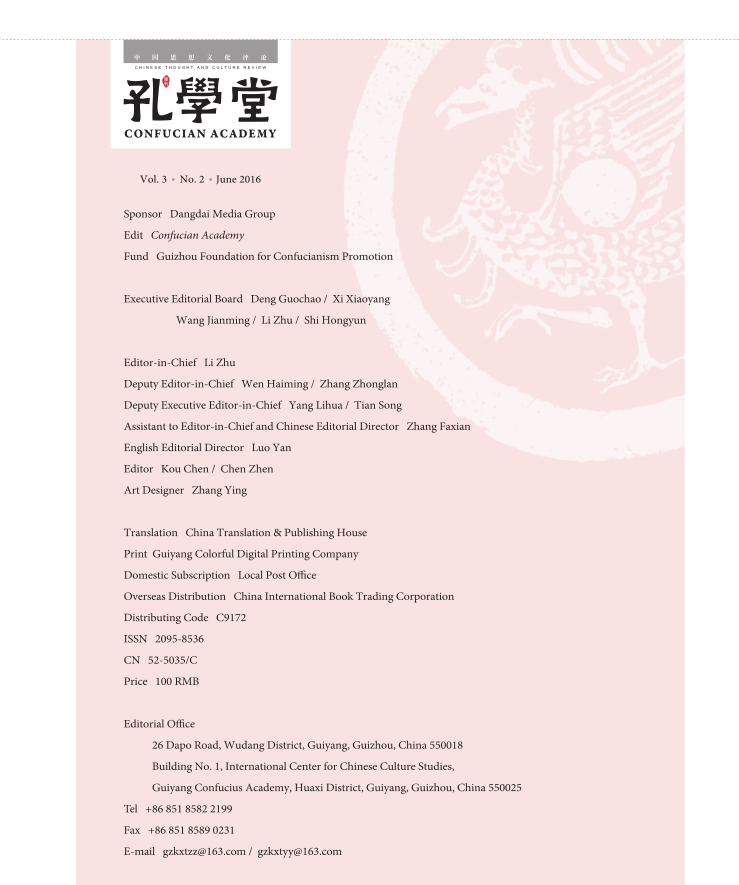


CONFUCIAN ACADEMY
Chinese Thought
and Culture Review
VOLUME 3·Number 2 ·June 2016
CONTENTS
Special Theme: Yangmingism and Its Modern Values
4 Revisiting Yangmingism: Introduction to the Special Theme
He Shanmeng
5 A Transformational Application of Wang Yangming’s Philosophy of the Heart-Mind to the Study of Modern Social Mindset
He Shanmeng and Li Shanshan
16 Three Dimensions of Wang Yangming’s ‘On Eradicating the Root and Source of Evil’
Xu Ning and Qin Zhen
27 Wang Yangming’s Theory and Practice of Shidao
Wang Shengjun
45 Wang Yangming’s Theory of Social Administration and Its Significance to Present-Day China
Luo Aiwu
Academic Forum
56 Distribution and Development of Guizhou’s Academies during the Qing Dynasty
Zhang Yuqiong
69 The Way of Laozi
Xiahai
88 Criticism and Inheritance of Traditional Chinese Female Virtues: A Study of Ban Zhao’s Lessons for Women
Xiao Qunzhong
Comparative Philosophy
99 Public and Private Morality in Civil Morality from the Chinese and Western Comparative Perspective
Zhu Guanglei
110 A Comparative Study of Eastern and Western Political Philosophies and Their Future
Shi Yongzhi
Masters of Chinese Studies
118 Qu Wanli’s Study of Yijing
Zhan Haiyun
Main articles Abstract
A Transformational Application of Wang
Yangming’s Philosophy of the Heart-Mind to
the Study of Modern Social Mindset
Abstract: From the perspective of cultural rejuvenation, Wang Yangming’s philosophy of the heart-mind has a theoretical and practical significance for today’s world. This article draws on resources from Wang’s philosophy to address people’s mindset problems in contemporary society. By effecting a transformational application to the study of modern social mindset, we can prove that Wang’s philosophy is not only valuable at the theoretical level, but also instrumental in addressing today’s practical concerns.
Keywords: Wang Yangming, philosophy of the heart-mind, social mindset, innate/intuitive moral knowledge, liangzhi, unity of knowing and acting
He Shanmeng is professor of Philosophy at Zhejiang University, doctoral supervisor, and a contributor to Guiyang Confucius Academy.
Three Dimensions of Wang Yangming’s
‘On Eradicating the Root and Source of Evil’
Abstract: Wang Yangming’s “Baben-saiyuan lun” [On Eradicating the Root and Source of Evil] marks the maturation of his philosophy of the heart-mind. This paper intends to reveal the three dimensions of Wang’s writing. (1) Historical dimension: Wang strove to reconstruct the Confucian orthodoxy since the Three Dynasties—the Xia, Shang, and Zhou dynasties. (2) Critical dimension: He systematically refutes selfish desires, heterodoxy, hegemony, and utilitarianism from the aspects of the sagely mind, sagely learning, and sagely rule. (3) Theoretical dimension: Wang proposes that “the clearness of intuitive knowledge is the same as in the most ancient times,” revealing the purport of his writing. He uses the “twelve-character doctrine” as his theoretical basis and the extension of intuitive knowledge as his theoretical form.
Keywords: Wang Yangming, “Baben-saiyuan lun,” eradicating the root and source of evil, Confucian orthodoxy, extension of intuitive knowledge
Xu Ning is professor and doctoral supervisor in the Department of Philosophy at the College of Politics and Economics in Shaanxi Normal University.
Qin Zhen is MA candidate majoring in Chinese philosophy in the Department of Philosophy at the College of Politics and Economics in Shaanxi Normal University.
Wang Yangming’s Theory and Practice of Shidao
Abstract: The rise of Neo-Confucianism in China’s Song and Ming dynasties was concomitant with changing ideas on shidao (the Way of teaching and teachers). As a pioneer and educator of the Neo-Confucian School of the Mind, Wang Yangming inherited these ideas with a spirit of innovation. He criticized the decadence of shidao in his time and tried to redefine the Neo-Confucian spirit of teaching, as he reestablished its standards, forms, and practices. His conception of shidao exhibits the strong influence of his philosophy of the mind.
Keywords: Wang Yangming, Neo-Confucianism, shidao, teachers, pedagogy, education
Wang Shengjun is Doctor of History, associate professor of the Chinese Culture Academy at Guizhou University.
Wang Yangming’s Theory of Social
Administration and Its Significance to Present-Day China
Abstract: Innovations in the social administration system are part of China’s effort to further modernize national governance. Broad lessons can be drawn from traditional Chinese culture to support these efforts. For example, Wang Yangming, one of the most renowned ancient Chinese thinkers and politicians, proposed many ideas on social administration. He asserted that intuitive knowledge (liangzhi) lays the intellectual foundation of good governance, that the extension of intuitive knowledge is the basic way of purifying the human mind, and that the unity of knowledge and action is the predominant method of regulating human behaviors. Most importantly, Wang put his ideas into practice by establishing the rural community covenant (xiangyue), founding community schools, and carrying out benevolent policies. His theories and practices can be important resources for the contemporary efforts to innovate regarding social administration.
Keywords: social administration, Wang Yangming, intuitive knowledge, unity of knowledge and action
Luo Aiwu, PhD in political science, is associate professor of the School of History and Political Science at Guizhou Normal University.
Distribution and Development of
Guizhou’s Academies during the Qing Dynasty
Abstract: The Qing dynasty saw a boom of academy development in Guizhou. Cooperation between the government and social entities fueled rapid development of these academies, even reaching certain ethnic minority groups. At that time, the academies were the mainstay of social education, the core of the traditional education system in Guizhou that replaced government-run schools and served as the hub of talent for the nation. A study on the development of Guizhou’s academies during the Qing dynasty shows its consistency with the nationwide development of academies in temporal and spatial distribution while featuring a clear distinction in locality and time period. The development of the province’s academies was subject to the central Qing government’s policies as well as local economic and political development, which manifested the way in which Guizhou’s economic and political development affected its education system.
Keywords: Guizhou, Qing dynasty, academy, distribution
Zhang Yuqiong is a professor at the School of History and Politics at Guizhou Normal University and Moutai College.
The Way of Laozi
Abstract: Laozi’s philosophy is centered on dao (the Way), which is an organic unity of the Way of Heaven, the Way of governance, and the Way of humanity. Through the Way of Heaven, Laozi explores the reality and origin of the world from ontological, cosmological, dialectical, and epistemological perspectives. The Way of governance addresses political rule, with its ideal society being a small country with few people, its ideal rulership with the ruler’s existence being merely known by the people, and its ideal government run by a sage-ruler. The Way of humanity probes human ethics and advocates the methods of returning to a state of infancy (simplicity), learning from water, and transcending the self. Research into the Way of Laozi is conducive to resolving the contradiction between the finiteness of the human body and the infiniteness of the human mind.
Keywords: the Way of Laozi, the Way of Heaven, the Way of governance, the Way of humanity
Xiahai, PhD of Law, is from the State Administration of Taxation.
Criticism and Inheritance of Traditional
Chinese Female Virtues: A Study of
Ban Zhao’s Lessons for Women
Abstract: Female virtues are specific to women, based on considerations of biological nature and social culture. Chinese people invest greatly in the cultivation and education of female virtues for the following reasons: (1) the relationship between husband and wife constitutes the origin and foundation of human relations; (2) the cultivation and education of female virtues are required to ensure a harmonious relationship between husband and wife; and (3) the female virtues guarantee the harmonious development of the family and the clan. Ban Zhao’s Lessons for Women epitomizes the Chinese cultural beliefs concerning traditional female virtues. We can critique and discuss how women can inherit these virtues with respect to the following corresponding beliefs: the relationship between man and woman should be based on principles of equality and difference; the Way of the husband and wife should be created with respect, mutual love, and devotion; a harmonious family is based on filial piety and fraternity; and the women can enhance their self-cultivation by practicing female virtue, speech, appearance, and work.
Keywords: traditional female virtues, criticism, inheritance
Xiao Qunzhong is professor and doctoral supervisor of the School of Philosophy at Renmin University of China.
Public and Private Morality in
Civil Morality from the Chinese and
Western Comparative Perspective
Abstract: The concept of civility in civil morality reveals an organic social state that includes both objective formal organizations and non-objective informal organizations. In this social state, public morality in civil morality is the moral will objectivized in formal organizations, and private morality is the moral will non-objectivized by informal organizations. The two kinds of complementary moralities safeguard and promote every individual’s rights of subsistence and development.
Keywords: civil morality, public morality, private morality, formal organization, informal organization
Zhu Guanglei, PhD, is associate professor of the School of Politics and Public Administration at Soochow University.
A Comparative Study of Eastern and Western
Political Philosophies and Their Future
Abstract: Both Eastern and Western political philosophies are based on rationality and share three notable characteristics: historicity, scientificity, and philosophical character. The political philosophies of the future should develop further in rationality, historicity, scientificity, and cosmopolitanism. More importantly, they should seek breakthroughs in philosophical character and advocate cosmopolitanism, rather than nationalism, with the objective of “living together in harmonious unity” for humanity as a whole. All these require the integration of both Eastern and Western intellectual resources and political practices past and present in order to clarify and affirm the scientific character of political philosophy as a discipline.
Keywords: political philosophy, rationality, historicity, scientificity, philosophical character
Shi Yongzhi is associate research fellow of the International Confucian Studies and Exchange Center at Shandong Academy of Social Sciences.
Qu Wanli’s Study of Yijing
Abstract: Qu Wanli is renowned for his accomplishments in studies of Confucian classics, particularly Shijing, Shangshu, and Yijing. His study of Yijing represents his greatest achievement, where he integrates the branches of traditional Chinese studies (philology, history, phonology, lexicology, dialectology, study of Confucian classics, and epigraphy) with some modern disciplines (folklore, anthropology, bibliography, the study of oracle-bone inscriptions, the method of dual attestation, new historical studies, and academic history), as part of academic efforts to progress from questioning documents of antiquity (the official history of the Song, Han history, and pre-Qin dynasties, and ancient times) to interpreting documents of antiquity (to reconstruct reliable histories of ancient times). As an absorber, transformer, and innovator in the scholarly transition from late Qing to modern China, Qu opened a new academic field where he introduced some new ways for studying Yijing, which call for continued scholarly efforts today for their improvement.
Keywords: Qu Wanli, Yijing, study of oracle-bone inscriptions, folklore, new history, bibliography
Zhan Haiyun is distinguished visiting professor of the Institute of Chinese Ancient Books at Sichuan University.
